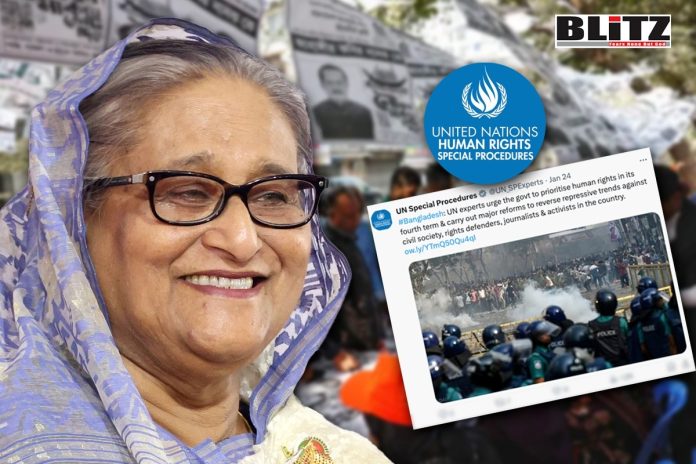The political landscape of Bangladesh has recently been rocked by the victory of Prime Minister Sheikh Hasina in the national elections, a win that has generated both applause and skepticism. The United Nations Human Rights Council-appointed experts have raised eyebrows by expressing deep concern over the electoral process, citing allegations of widespread human rights abuses and violations. This comprehensive article aims to delve into the unfolding situation, meticulously examining both the claims made by the UN experts and the contrasting viewpoint put forward by the Bangladesh government and its supporters.
Prime Minister Sheikh Hasina secured a fourth term in a hotly contested election, marked by a controversial boycott from the main opposition party. The election process was marred by violent protests, resulting in casualties and the arrest of thousands of opposition leaders and supporters. The opposition alleges that the ruling party employed coercion and violence to influence voters, while the government contends that the elections were fair, transparent, and reflective of the will of the people.
The concerns voiced by the UN-appointed experts, including Special Rapporteurs on various human rights aspects, have added a layer of complexity to the aftermath of the elections. Reports of attacks, harassment, and intimidation against civil society, human rights defenders, journalists, and political activists have prompted the experts to call for independent investigations into these serious allegations. The experts emphasize the need for prompt and impartial inquiries to address the numerous human rights abuses reported during and after the elections, thereby ensuring accountability and justice.
In response to the UN experts’ statements, the Bangladesh government has vehemently dismissed the allegations as baseless and politically motivated. Supporters of the ruling party argue that the election results were legitimate, as evidenced by the congratulatory messages pouring in from leaders around the world, including UN Secretary-General Antonio Guterres. The government contends that the UN experts may have been influenced by external forces, particularly pointing to lobbying efforts by the main opposition parties, such as BNP and Jamaat.
Prime Minister Sheikh Hasina and her Bangladesh Awami League have received widespread international recognition and support following their victory in the national elections. Congratulations from global leaders, including those from Japan, France, Indonesia, Nicaragua, Czech Republic, Belarus, Malaysia, Italy, Finland, Algeria, India, and Russia, highlight the positive reception of the election results. The contrast between the international acknowledgment and the concerns raised by UN experts raises questions about the motives behind the statements.
A deeper exploration is required to address the accusations that external influences, such as lobbyists for the opposition parties or individuals with ties to controversial figures like Muhammad Yunus and Hillary Clinton, may have swayed the UN experts’ opinion. Analyzing the possible motivations behind the UN experts’ critique becomes essential in understanding whether there is a legitimate basis for their concerns or if external factors are seeking to delegitimize the election results for political purposes.
The UN experts have highlighted the need for reforms to ensure the freedom of expression, association, and a diverse and independent media. A more in-depth analysis of the state of civil society and media in Bangladesh becomes crucial in evaluating the validity of these claims. Are there verifiable instances of stifled dissent, attacks on journalists, and limitations on freedom of expression, or are these allegations exaggerated? Understanding the role of civil society and media in the electoral process is vital for a comprehensive analysis.
The controversy surrounding the UN experts’ statements on Bangladesh’s recent elections requires a nuanced examination of the facts, motivations, and implications. While the international community has congratulated Prime Minister Sheikh Hasina, the concerns raised by the UN experts cannot be dismissed outright. A thorough and impartial analysis is essential to determine the legitimacy of the electoral process and to chart a path forward that upholds human rights, democratic principles, and the rule of law in Bangladesh. In this complex scenario, it is crucial to balance political perspectives with a commitment to ensuring the protection of human rights and fostering genuine democratic practices.





Thank you for exposing this.
Comments are closed.